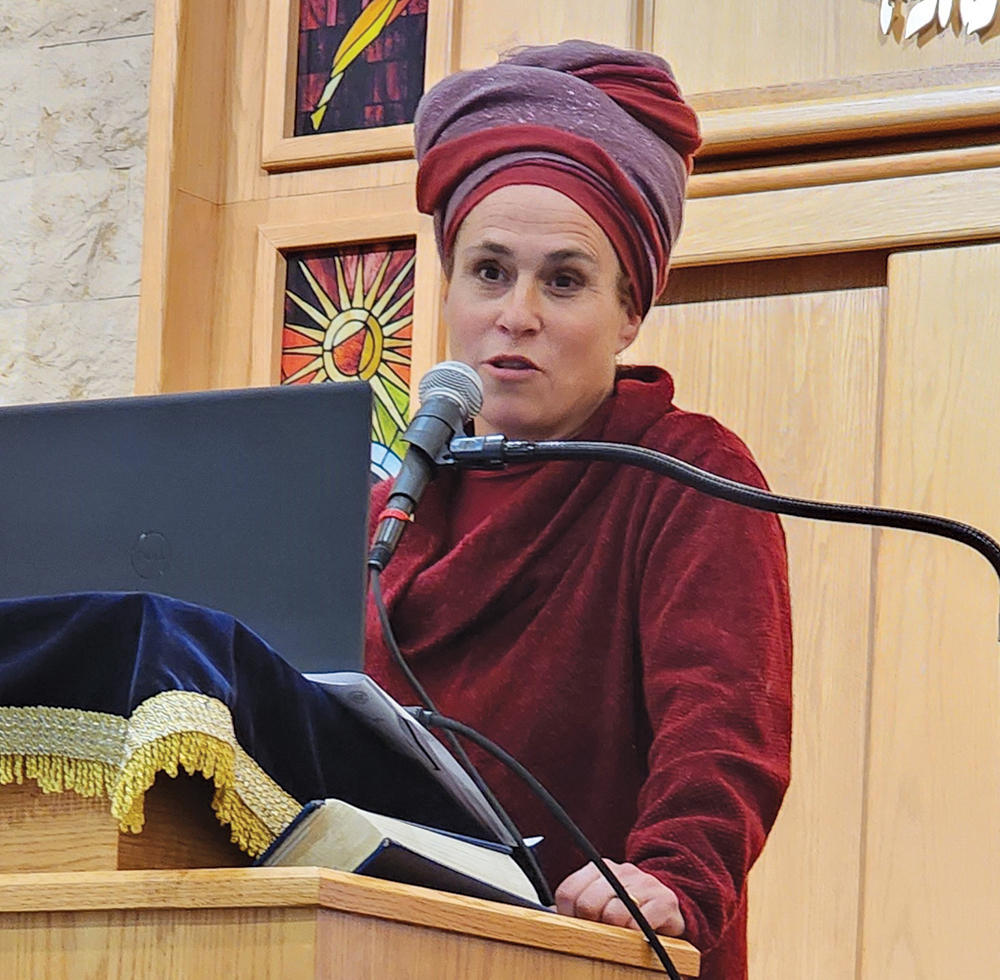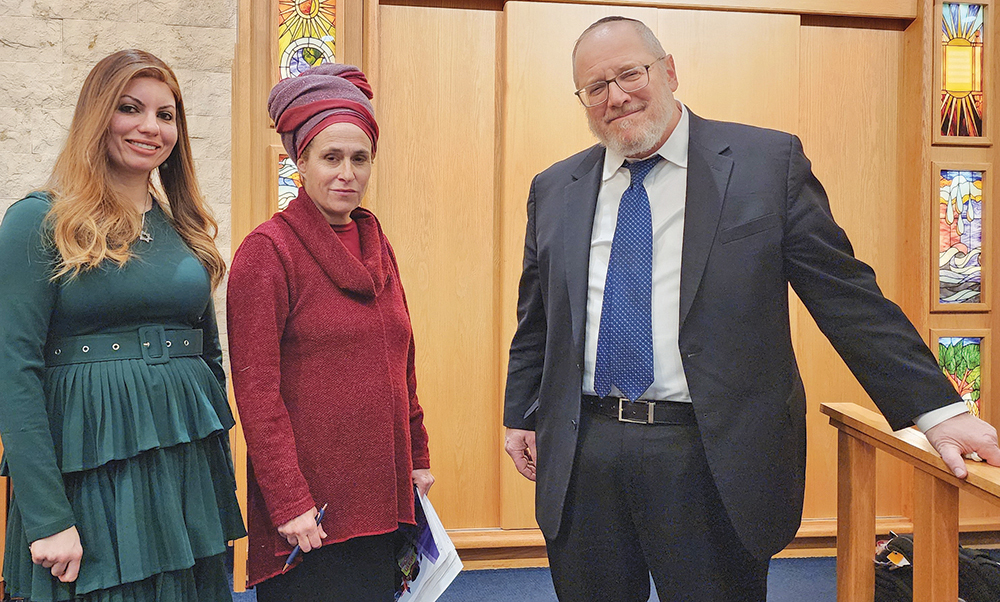
Several dozen people came to Congregation Ohav Emeth in Highland Park Motzei Shabbat on January 20 to hear Natalie Sopinsky speak about life in Israel and her role with Rescuers (Hatzalah) Without Borders. Sopinsky brought her perspectives about the events of October 7 as a resident “outside the Green Line,” as a mother of members of the IDF, and in her role as a member of Hatzalah.
Event organizer and longtime Israel activist Rivka Sonts had followed several online groups that featured Sopinsky and thought it would be a good idea to have her come to the Highland Park/Edison community.
Sopinsky began her program by thanking everyone who came out on “the coldest day of the season to hear what I have to say.” Having grown up as a Conservative Jew in Delaware and becoming religious later, her life in the Shomron town of Susya is a far cry from what she knew in the United States.
The Susya community’s slower pace and “bucolic life” are particularly appealing. While it may have appeared differently in the news, residents felt safe and lived without fear. “Nobody locked their house or car.” It is a ruggedly beautiful area with lots of open space that needs more Jewish residents. Walking her dog early on the morning of October 7, she was confused by smoke she was seeing in the distance and hearing what she thought was thunder. A friend she saw on the street agreed that something was wrong. Her fears were confirmed when she returned home and saw her Orthodox son in uniform and on the phone instead of getting ready for Simchat Torah services.
As her older sons left for war, there was still a holiday to observe. Her 13-year-old son told her that he thought he was drunk when he saw his father driving a car on Yom Tov. People at synagogue services couldn’t believe the bits and pieces of news that they heard. A few days later, the usually deserted route where Sopinsky walks her dog was filled with soldiers, and two intruders were found in the community. “Our enemies are watching and waiting. They say October 7 was a rehearsal and they are planning more terror and tragic events, and I believe it.” The community has no fences, which interestingly can be seen as a good thing. The Arabs don’t know where the community borders actually are so it gives them pause. “We can’t cower and be hesitant. We can’t be quiet and weak Jews—even if the rest of the world likes quiet and weak Jews.”
There are 200 families in the small, close-knit Susya community; they have sadly already lost three soldiers. “You see the shiva tent go up near the house of mourning and there is a steady stream of people,” said Sopinsky. “You can’t escape the news and announcements of losses as they are everywhere.” Adding that sleep is an escape from hearing more bad news, “I woke up on October 8 with a sick feeling and wondered how long it would be before the world would turn on us.”

Life is slowly getting back to normal. Schools are slowly reopening, but many of the teachers have been called to active duty. “With so few teachers, some schools are taking the students to pick fruit.” All the soldiers (no matter their ages) are “our children.” A chat group lists what soldiers personally want—items like Hebrew-language “Harry Potter” books. There are trucks outfitted with washing machines and dryers so soldiers can do laundry, barbecue events, and trucks with traveling barbershops or showers. “We don’t raise our children to be soldiers, but it is what has to be done.”
Sopinsky noted that radio stations broadcast Hebrew music into Gaza along with messages from family members of hostages on the chance that they will be heard. The hostages should know they are not forgotten with broadcasts of “We are waiting for you” or “We will have pancakes for breakfast when you come home.”
The program concluded with a brief video of the work Rescuers Without Borders does within and outside Israel.
Marilyn Berger of Highland Park came to learn “about the firsthand experience of what the settlers are experiencing.” Edison’s Debby Botvinick described herself as a Zionist who loves the land of Israel. “I’m in awe of someone who settles and volunteers there.” Cheryl Amdur was glad she came to learn firsthand about what was actually happening and not what is in mainstream media.
Rescuers Without Borders was founded in 2001 as Hatzalah of Yehuda and Shomron during the First Intifada to provide emergency medical care to residents who were difficult to reach if ambulances had to go through checkpoints from other parts of Israel. The 1,600 medics on staff who live in the towns they serve can get where they need to go quickly using shortcuts only locals are familiar with.
The name of the organization was changed when the group was overseas helping at the site of a natural disaster. A CNN camera crew was filming them and praising their actions. When they found out that the Hebrew writing on the rescuers’ jackets meant they came from beyond the Green Line, the CNN crew promptly turned off their cameras and left the area. The new politically correct name presents fewer problems.
Sopinsky represents the 150 communities in Yehuda and Shomron as director of development for Hatzalah Without Borders, the main U.S. charity for emergency medical needs in the Jewish heartland. Specific donations are requested for a highly equipped ambulance for Eshkol that would bring emergency room technology to the region where it is difficult to get to a hospital.
For more information or to donate, visit: https://hatzalah.org.il/en/
Deborah Melman is a staff writer at The Jewish Link.










